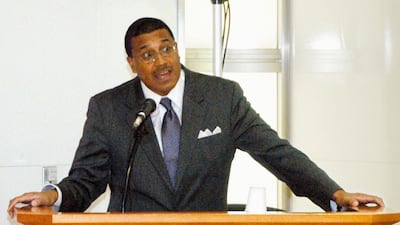ABU DHABI // The Arabian Gulf must keep up with the rising threat of ballistic missiles in the region and build a GCC-wide missile defence system to ensure its security, said a United States arms official.
Frank Rose, assistant secretary of arms control at the US state department, said during a speech at a US-UAE Business Council dinner in Abu Dhabi that such a move would provide GCC countries with better early warning capability and a more layered and effective defence.
“We can see increasing capable ballistic missile threats to the GCC from multiple directions,” Mr Rose said. “The ball is now in the GCC’s court.”
In the past few years, the missile threat has increased and it is likely to continue over the next decade, according to the ballistic missile defence review, which said in 2010 that missile systems were becoming more flexible, mobile, survivable, reliable and accurate, while also increasing in range.
“They got it exactly right,” said Mr Rose, whose visit to the region was his 10th. “The restrictions placed on Iran’s nuclear programme have significantly improved regional security by preventing the threat of a nuclear-armed Iran.
“Nevertheless, Iran maintains a large and diverse ballistic missile arsenal that includes close-range through medium-range ballistic missiles.”
Over several years, Syria has also carried out dozens of ballistic missile strikes against its own population alongside rocket and artillery attacks carrying chemical weapons, inflicting widespread casualties.
“These attacks, along with vicious chlorine gas and barrel-bomb attacks, have contributed to the immense suffering of the Syrian people,” Mr Rose said on Monday.
In Yemen, ballistic missiles have been used frequently by the Iran-backed Houthis. “These developments argue for thinking about ballistic missiles and our potential responses in a strategic context,” he said. “As well as military responses, missile defence can support political and diplomatic activities to reduce regional tensions by enhancing regional stability, and by assuring leaders and populations under threat that they have a defence against attack.”
Analysts said the speech was an accurate reminder of rapidly proliferating ballistic missile threats in the region.
“The demand for such capabilities is certainly rising much faster than their supply because the threat is so complex and constantly evolving,” said Sabahat Khan, senior analyst at Near East and Gulf Military Analysis. “GCC states and the US both recognise the extent and complexity of the ballistic missile threat as well as the underlying need to develop partnerships that can help address these threats.”
He said the Gulf had long recognised the need to integrate its air and missile defence systems to effectively counter the threat of cruise and ballistic missiles – from Iran, primarily, and others.
“A regionally integrated air and missile defence shield can ensure that much greater and much more effective protection against missile threats can be achieved,” he said.
Gulf states have been investing heavily over the years in upgrading existing capabilities, such as introducing new systems like the US army anti-ballistic missile system Thaad.
“In the years ahead, they will continue to add missile defence systems into their inventory,” Mr Khan said. “But the more important and complex challenge is arriving at a truly integrated regional ballistic missile architecture and here, all of the [parties] require a common vision.”
A collective response is as important as an individual one, according to Abdulkhaleq Abdulla, chairman of the Arab Council for Social Sciences. “This has been in the making for some time,” he said.
“GCC states, especially the UAE, have been aware of these threats and I think the UAE is probably ahead of other GCC countries in terms of building its anti-missile and anti-rocket system, but what is lacking so far is an integrated Gulf system.
“With Iran going nuclear, the development of its missile -capabilities to a point beyond belief and this political rivalry escalating and looming -between Riyadh, Tehran and the GCC, a defensive response should be taken seriously and invested in.”
cmalek@thenational.ae

